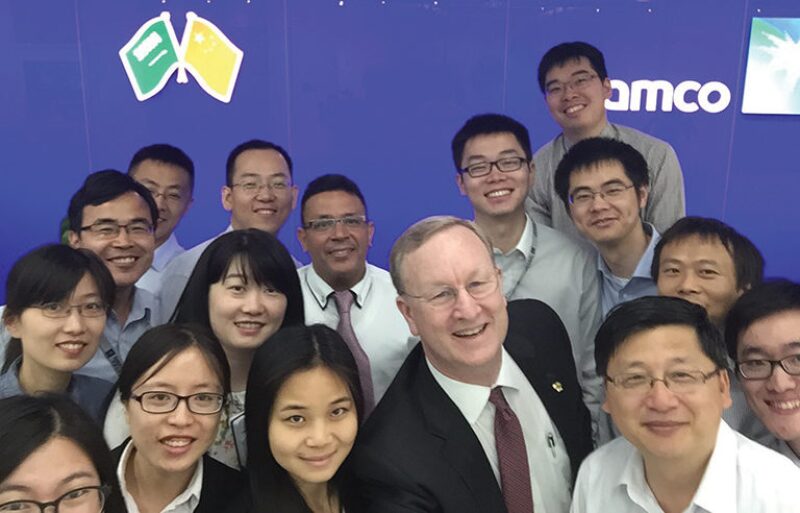Nathan Meehan is senior executive adviser at Baker Hughes, where he advises executive management on reservoir and geoscience issues. Previously, he served as the president of CMG Petroleum Consulting, an independent consultancy; vice president of engineering at Occidental Petroleum; and general manager of exploration and production at Union Pacific Resources. Meehan earned a BSc in physics from the Georgia Institute of Technology, an MSc in petroleum engineering from the University of Oklahoma, and a PhD in petroleum engineering from Stanford University.
What goals would you like to accomplish during your term?
I would like to focus during the next year on helping SPE accomplish five interrelated goals.
- Making sure that SPE stays relevant and useful to our members and the industry we serve
- Encouraging more interdisciplinary and inter-industry collaboration
- Focusing on the “public benefit” aspect of SPE’s mission
- Recruiting and mentoring the next generation of oil and gas professionals
- Expanding and improving the way we communicate
These accomplishments will support SPE’s mission: To collect, disseminate, and exchange technical knowledge concerning the exploration, development and production of oil and gas resources, and related technologies for the public benefit, and to provide opportunities for professionals to enhance their technical and professional competence.
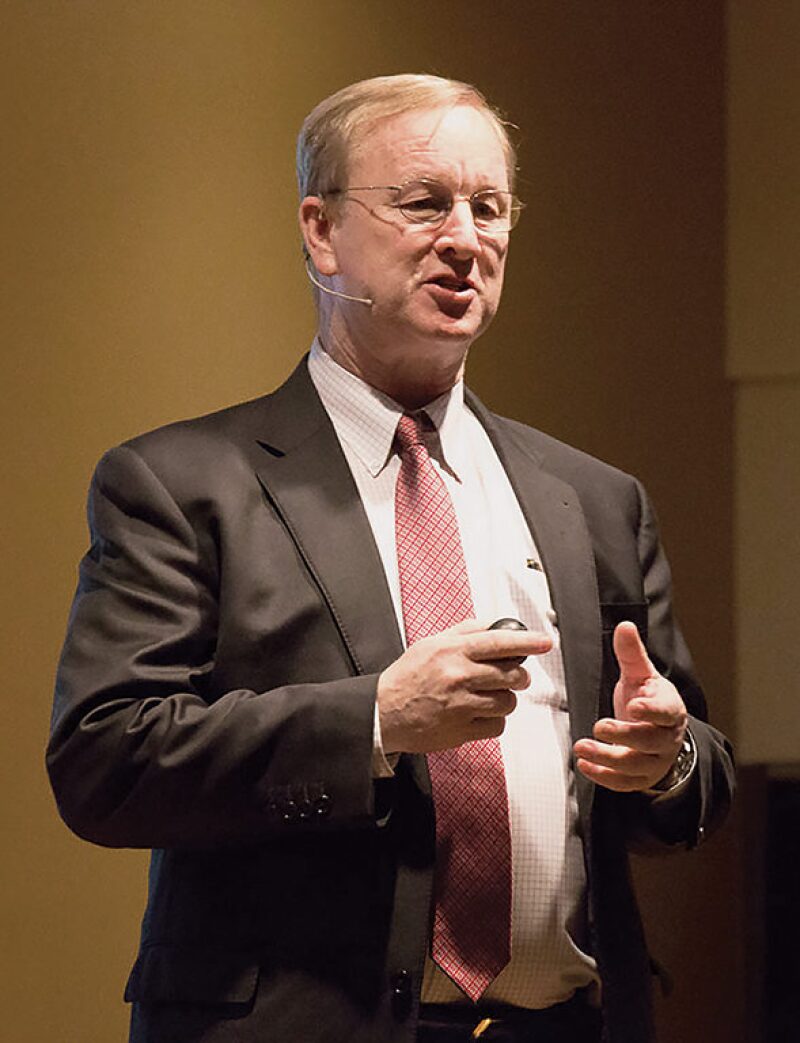
On top of the ongoing challenges we face as an industry, we now have to contend with low prices. Yet, we still have to deliver the huge volumes of oil and gas that are needed each day by the 7.2 billion people who inhabit our planet. And, we have to do it more safely, more economically, more quickly, and more sustainably. We cannot compete—or in some cases, even survive—doing business as usual. We need disruptive technologies and processes. But change is difficult to accept. This is where SPE can play a pivotal role.
Innovation comes about by thinking differently and creatively, by connecting seemingly unrelated ideas, and putting them together in unrelated ways to produce something novel or original. This requires collaboration among diverse and disparate groups of people. One of my colleagues likes to describe SPE as a network of bridges that connects people, companies, and ideas to enable the collaboration that fuels innovation. That network of bridges is never more important than during difficult periods such as the one we are currently experiencing. By reaching out to other disciplines and other industries, SPE not only helps fuel collaboration and innovation, but also fulfills its mission of staying relevant.
For example, it is more important now than ever that we address the needs of entire asset teams, not just engineers. One of the greatest things that has happened to asset teams in the past 10 years has been the fact that now geomechanics is a part of most major asset teams, probably in the same sense that petrophysics is. Every asset team has a reservoir engineer, a geologist, a geophysicist, and access to drillers and maybe production engineers. They may not have a full-time petrophysicist but they engage one at the right point. The same is the case with geomechanics. Ten years ago, it was a highly specialized discipline; now it is really a part of how we do business.
Today’s asset teams may also include software professionals, other information technology experts, and facilities managers, just to name a few. All of these specialists should belong to SPE in addition to their own professional societies. And, SPE’s programming, education, and outreach should expand to meet their needs as well as those of its traditional members.
The knowledge on which current and future innovation in our industry depends resides everywhere, thanks in part to computers and the Internet. It lives in agencies, universities, laboratories, and different geographies, and in industries ranging from health care to aerospace. My company has been an active participant in an endeavor called Pumps & Pipes, which was founded in 2007 specifically to explore potential crossover ideas and technologies among academia and Houston’s medical, oil and gas, and aerospace communities. SPE has included this endeavor in recent conferences. I look forward to more of these collaborations, and I think our members will, too.
With regard to public benefit, I would like to see us emphasize this a little more than has been done in the past. I think sometimes we overlook this aspect of our mission. Our industry has an obligation to society to provide safe, affordable energy to the world, and we do that. But we do not tell our story very well.
A couple of things come to mind: sustainability and health, safety, and the environment (HSE). Historically, we have not emphasized HSE across conference programming as much as we could have. Increasingly, asset teams find HSE issues a part of their intrinsic operations. I have taught an ethics class for many years, and I think it is important that the industry reflects on what our role in society should be and how we should do our business.
I do not think the public believes oil companies. What the public does believe is their neighbor who works in the oil and gas business and who is informed and knowledgeable. When I talk to concerned neighbors, or when I meet people as I travel, I try to communicate what the real issues are without trying to sugarcoat them. When you are able to discuss the issues, the challenges, how the industry is responding, as well as the importance of supplying energy, people will listen. Sure, there are people who are not going to listen and who have no interest in facts, just as there are people who have no interest in hearing the problems. That is why I want to make sure Energy4Me and all the other SPE resources enable our members to speak intelligently about the industry.
I think the industry can do a much better job of communicating that message. The fact is oil and gas are pretty clean in an absolute sense and when you think of all that oil and gas has enabled—feeding, fueling, heating and cooling populations; illumination; communications; industry; medicine; education; longevity—we should be proud. All the “good stuff” in our lives requires energy, and oil and gas is its main source.
In a sense, we have failed to make the moral case, take the moral high ground, on this. SPE is the perfect forum. When I give a speech to industry professionals, I almost always end it this way: I say that what we do is important, what we do changes people’s lives, and improves people’s lives. We have made mistakes and we continue to make mistakes, as does every industry. Yes, we need to do a better job of delivering our products, ensuring their safety, and minimizing environmental impact. We must minimize fugitive methane emissions, capture and store, or eliminate some of the CO2 impacts. We must eliminate spills. And, we must communicate our efforts and outcomes honestly and effectively.
How has the drop in oil prices affected SPE programs and services?
It has affected SPE revenues, and we have had to cut back on some of our training and a few of our workshops. But the main concern is how the drop has impacted SPE members. Our priority was to grow and expand. Now we are focusing more on identifying and responding to members’ needs.
We have taken steps to lower costs and eliminate dues for members who have been without jobs for a year or two. We are making sure our members stay up to date technically. We have launched a global jobs page with Oilpro to help our members find jobs. We are seeing sections and student chapters conduct activities to help members learn how to be consultants, find jobs in downturns, and communicate better. Many members have never had to interview for jobs. For a long time, it has been easy to get a job, but now it is difficult.
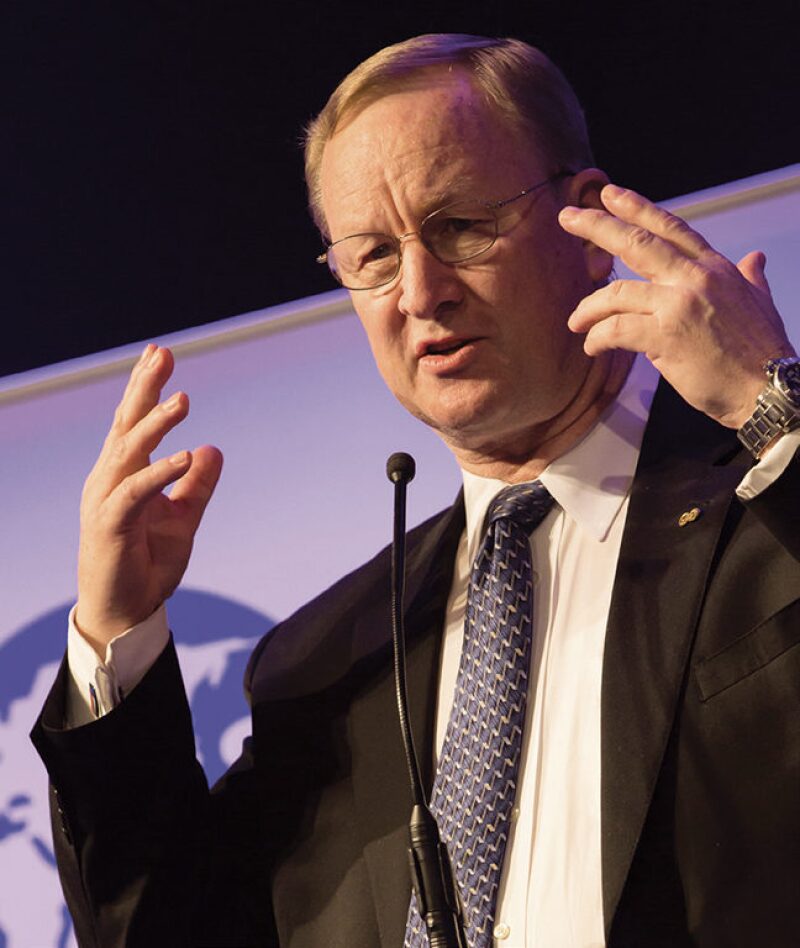
Is there any way the industry can manage these price cycles differently?
I challenge the assumption that the oil and gas industry has booms and busts in some unusual way. If you look at commodity prices for any industry—if you look at coffee prices or tin prices or copper prices—every commodity business has more cyclic, more variable prices than we do. They may not have the same domestic job impact, but they have highly erratic prices.
I think price cycles—and the resulting hiring and layoffs—will always characterize our industry.
When prices go up, activity goes up. Look at hydraulic fracturing—it really exploded. We had a time when people had to wait for months for fracturing jobs. And what was the service companies’ response? It was to massively overbuild capacity. And as soon as we did, prices dropped like crazy.
The good news is that this is a great time for innovation. When oil prices and rig counts are high, asset teams scramble to keep up with activity, so there is little time or inclination to innovate. When prices are lower, it presents an opportunity to do something different and better.
How will the downturn affect students and young professionals and their view of the industry?
This is a source of anxiety. I make a point to see student chapters whenever I travel. The students are concerned about how long the low prices will last, and whether they will be able to get jobs. Oil price changes are hard to predict; they could go even lower, or USD 50 to USD 60 could be the new long-term price. In 1985, many people thought prices would soon recover to USD 40/bbl, but they stayed at USD 20/bbl for a long time. And we drilled a lot of wells and developed a lot of technology at USD 20/bbl.
We are going to continue to have a shortage of technical talent. Although there are still a lot of senior people in the industry, the number of people retiring over the next 4 or 5 years will be very high. We are going to need more engineers and maybe engineers who focus differently.
SPE could benefit from expanding the student chapter infrastructure. Most student SPE chapters are affiliated with the schools or departments of petroleum engineering. I think it is time to expand to mechanical, electrical, and chemical engineering. To geology and other geosciences. To computer science. To math and environmental science. To solve the challenges we will face going forward, we need expertise, knowledge, and ideas from all of these areas.
To ease fears about job insecurity, SPE can help share examples of what people have done in previous low-cost environments that succeeded. For example, I remember a project for which we thought we needed USD 40/bbl oil, and then oil went to USD 20/bbl. The team that had worked so hard to develop the technology feared being laid off or asked to abandon the project. Instead, they were able to improve results, lower costs, and make the technology commercial at USD 20/bbl, and change how we did things.
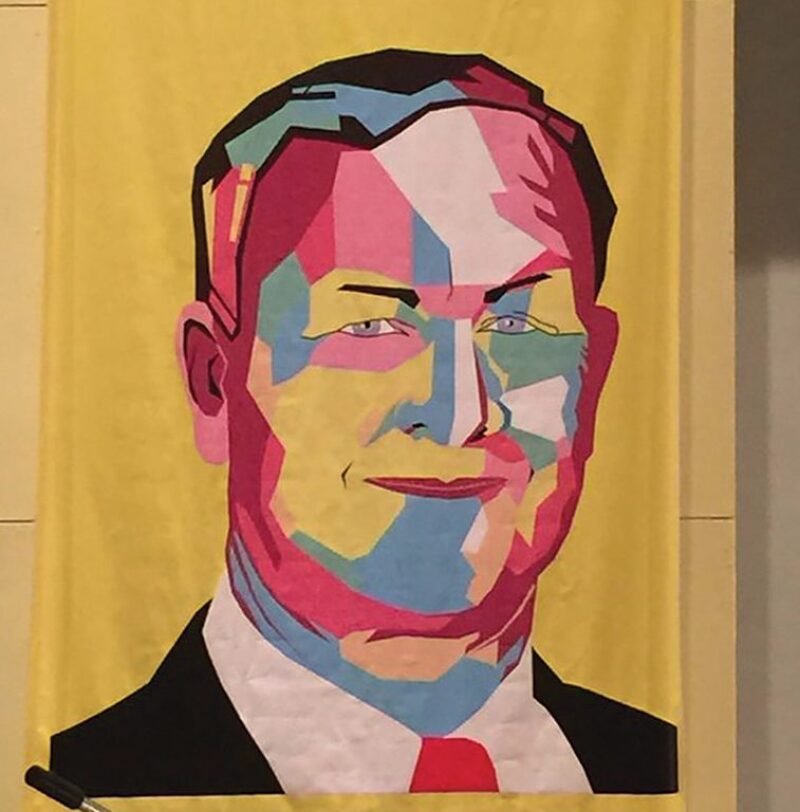
How did you get started in the oil and gas industry?
I was a physics major at Georgia Tech, in one of the few states in the United States that has zero oil and gas production, and I worked one summer digging a fracture pit. I did not even know what that was at the time, but I was looking for temporary work and they needed somebody who could operate a bulldozer. I knew how to operate a backhoe and claimed that I could operate a bulldozer. It turns out that they are very different. But I put that on my resume as one of my summer jobs, and a recruiter for Schlumberger noticed it. He took me on a job interview and I spent 3 or 4 days in New Orleans onshore and offshore working with several senior wireline engineers. When I went back to Georgia Tech, Amoco was recruiting for geophysicists. I told the recruiter I wanted to be a petroleum engineer and he told me it was a good time to be one. I got a summer job with Amoco as soon as I graduated, and the first thing he told me was, “Well, for a summer internship, physics is OK, but if you want to be a petroleum engineer, you have to get a degree in engineering.” My dad, a University of Oklahoma (OU) alumnus, said that OU had a petroleum engineering program, and I got my master’s degree there. That story has a few other little twists and turns, but that is pretty much how I got interested in the oil business.
What are the biggest challenges to SPE in the short term?
The biggest short-term challenge is the pressure from reduced meetings and travel because of low oil prices. We need to do more Web-based events and communication, such as webinars, and we will need to minimize the costs of training, conferences, symposiums, and workshops. The demand for training and communication is still there, as high as or higher than ever. But you cannot replace our conferences and meetings with the Web. The SPE Annual Technical Conference and Exhibition is more international now, and will be held next year in Dubai, and that presents some challenges. The cool part is, for people in Africa, Asia, and Europe, that will be a pretty short flight, compared with traveling to Houston or San Antonio. It is a long way from Romania to San Antonio.
How has SPE changed since you were first on the SPE Board of Directors in the late 1990s?
We are much more international. I joined SPE 40 years ago when I was in graduate school at the University of Oklahoma and my professor came by on the first day of class and handed out applications and said, “If you are going to be a petroleum engineer, you join SPE.” And we filled out the applications right there and gave him the money. SPE was obviously a much smaller organization then and a very North American one. At the time, most of our members lived in the US and most of our meetings were in the US. But that has changed dramatically and more than half of our members now reside outside the US.
What do you see as the main benefits of SPE membership?
It is really all about the people in this industry as much as it is about technology. Clearly, SPE is where oil and gas people are. This is where we meet, engage, and interact. SPE is a lot of different things and a lot of different people. Clearly, technology dissemination is the core. But our mission is also related to the development of engineering professionals, and that is about relationships.
At one point in my career, I became a consultant, and it was the relationships I had developed through SPE that gave me the contacts I needed to find projects. The largest project I ever worked on came about through someone I met at an SPE event. SPE is all about members, improving our performance, and improving our relationships and careers.
How could SPE most benefit members going forward?
The best way members can benefit from SPE is to volunteer with SPE. Most SPE members benefit from the information, conferences, magazines, and journals, but those who take that extra step and decide to get engaged—whether in a local section or in meetings and workshops, or as an author or presenter—get tremendous additional benefit because of the interactions they have with others.
Providing really meaningful opportunities for interaction and volunteerism is one way that SPE can continue to do a great job for members. Even with lower oil prices, there will continue to be plenty of opportunities for our members to engage and be involved and come up with creative ideas.
How can SPE most benefit the industry?
SPE’s benefit to the industry is really obvious in terms of being the source of technical excellence and expertise. With 143,000 professional and student members and staff, SPE’s font of knowledge is wide and deep. And, its reach and focus are global.
No place else can you find an electronic library such as OnePetro.org, which has more than 180,000 documents that are searchable and accessible at a moment’s notice. Members have the ability to access the state of the art, whether through PetroWiki, OnePetro, or all the other sources of information that SPE offers.
It is phenomenal how much usage PetroWiki gets. The way people think about getting information and sharing it is changing. For example, right now, if you forget what kind of weighting you should use for mobility in reservoir simulation upstream, you must get a book and physically look through it. Ultimately, you will be able to go to PetroWiki for that. SPE resources are where you go to find out about the facts; it is the place to find out about the oil and gas industry.
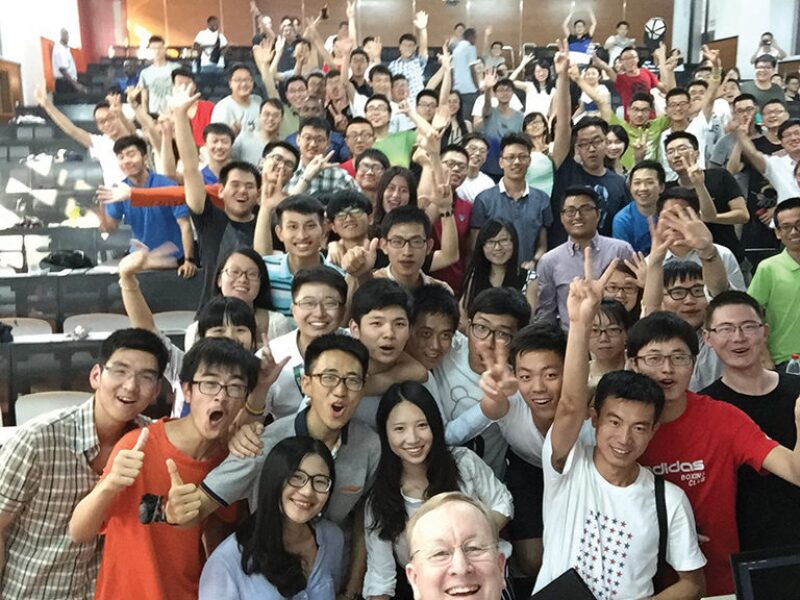
What are your main interests outside of work?
I am a beekeeper. I collect custom knives. I shoot long-range rifles. But, most importantly, I study Chinese. I think I could study Chinese my whole life and never actually be good at it. I lived in Hong Kong for a year-and-a-half and have traveled all over Asia with my wife in a humanitarian role. I found the people, the culture, and the food interesting, and decided to start learning Chinese. I can now carry on enough of a conversation with a Chinese speaker that someone who does not speak Chinese thinks I speak it, but that is a work in progress.

